Courses in Climate Change & Environment
Self-paced
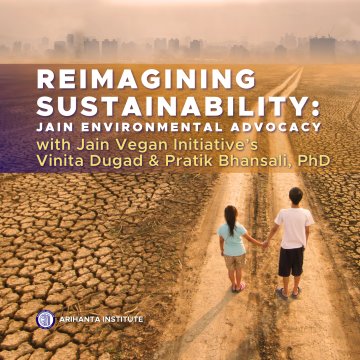
106 | Reimagining Sustainability: Jain Environmental Advocacy
The Jain Vegan Initiative brings this course designed to introduce the connection between Jain Philosophy and Environmentalism. It introduces a unique lens for looking at the environment by understanding how various communities are affected differently, and how measurements of environmental impact that take into global average impacts dilute a sense of urgency. The stress-free transition from being part of the problem to being a part of the solution in a busy and rapidly urbanizing life will be discussed. The course will entail action oriented self-assessment and discussion regarding effective ways of spreading environmental awareness. Learning Objectives:Looking at the environment and environmental action from the Jain lens.Learning about how using global averages to assess environmental impact dilutes the sense of urgency and the disproportionate impact on different communities.Understanding how ignoring the effects of day to day individual choices may imply participation in propagating injustice.Learning how our individual actions are tied to systemic problems of capitalism and consumerism.Obtaining a practical, stress-free, and planned approach to lifestyle transition in a busy, rapidly urbanizing life, and some ways of creating increased environmental awareness
$99.00 USD
Instructors
Self-paced
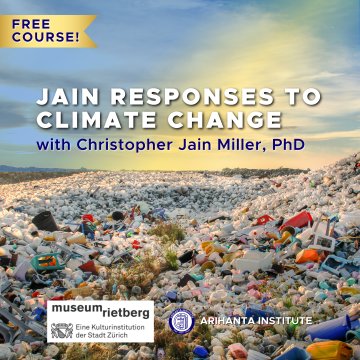
1008 | Jain Responses to Climate Change
Added to cart
1008 | Jain Responses to Climate Change
Arihanta Institute is offering this course in collaboration with Museum Rietberg, coinciding with their Exhibition “Being Jain: Art and Culture of an Indian Religion” in Zurich, Switzerland.Climate change is arguably the biggest collective challenge human society has ever encountered. But there is hope. Among many of the innovative solutions that have and continue to be proposed, the Jain tradition encourages an environmentally sustainable lifestyle, which, if incorporated into our daily lives worldwide, could have a significant impact in reducing the worst of the climate disaster that is yet to come. Learn the Jain way of life in conversation with some of climate change’s most pressing issues. Leave transformed and empowered to reduce your climate footprint.Class 1Jainism and Ecology: Recognizing the Interconnected Web of LifeLearn how the Jain tradition views the world as an interconnected web of life in which nothing wants to experience pain. Understand how the Jain principle of ahiṃsā, or non-violence, arises from this worldview and some of the fundamental ways you can reduce your carbon footprint by following the Jain way of life and in accordance with climate science.Class 2Jain Approaches to Food: Climate Change & Animal AgricultureThe IPCC (Intergovernmental Panel on Climate Change) recently advised that in light of the effects of animal agriculture on the climate, the entire planet must be “veganised.” Learn, in light of climate science, why animal agriculture is one of the most significant contributors to climate change and environmental degradation. Also study Jain approaches to an ethical and environmentally friendly diet that call into question our unnecessary reliance on animals for food.Class 3Jain Views on Consumption and Waste: A Changing Climate requires Changing HabitsHumans consume food, electronics, fuel and other commodities at rates far beyond what our planet can sustain in the long run and which amount to significant amounts of environmental degradation. Discover what the acceptable limits of consumption are, and also consider Jain ethical approaches to the human behavior of consumption. Be inspired to reconsider your own consumptive habits.Class 4Jain Professional Ethics: Making a Climate-Friendly LivingWe all need to make a living, but what would it mean to make a “climate-friendly” living? Learn Jain ethical approaches to career and professional life, and understand the important connections between the work that you do and its potential effects on the climate. Be inspired to make a righteous living that is good for both you and our climate future.
Free
Instructor
Self-paced
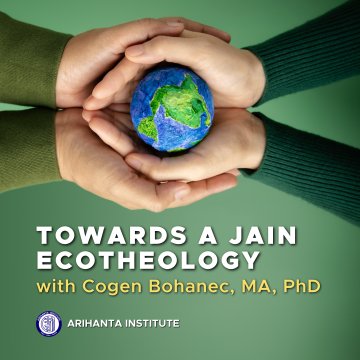
1010 | Towards a Jain Ecotheology
Added to cart
1010 | Towards a Jain Ecotheology
For millennia, it has been widely recognized that the Jain tradition has been distinctive in its central focus on nonviolence (ahiṃsā) towards all beings (jīva-s). Because of this, Jain theology is uniquely oriented towards healing humanity’s strained relationship with the natural world. For several decades, the field of ecotheology had been developed by various thinkers from multiple world religious traditions, Christian in particular.In this course, we will articulate a clear understanding of the methodology of ecotheology that can provide a framework where religious traditions might effectively advocate and empower ecological healing based on the unique paradigmatic resources of each tradition. This course will then examine what the Jain tradition might contribute to the bourgeoning academic discipline of ecotheology, and how the Jain tradition can play an important, necessary, and unique role in a pluralistic approach to environmental healing.
$99.00 USD
Instructor
Self-paced

1016 | Feeding the World: Toward a Plant-Based Food System
The global food system is a paradox: it is at once incredibly productive and terribly destructive. Perhaps nowhere is this paradox more evident than in animal agriculture, which feeds billions of people but causes widespread environmental, public health, and ethical problems. This course asks what the food system would look like without large-scale animal agriculture and what the benefits and challenges would be to feeding the global population on a plant-based diet. This course will introduce students to the concept of food systems and food system analysis, delve into the impacts of animal agriculture, and sketch out the possibilities for building a plant-based food system. Course Details6 hours of recorded video contentWeekly readings for self-studyAccess to class materials begins Monday, October 7, 20244 scheduled, 60-minute Live Q&A sessions with Professor Dutkiewicz on October 15, 18, 25, and November 1 from 8AM to 9AM PacificCourse Materials will be available beginning Monday, October 11, 2024.
$25.00 USD
Instructor
Self-paced
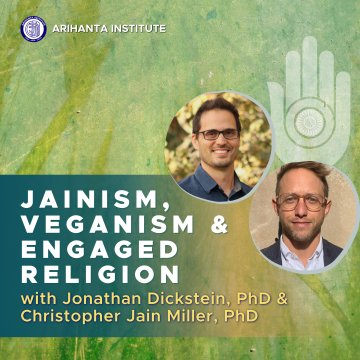
1014 | Jainism, Veganism, and Engaged Religion
Added to cart
1014 | Jainism, Veganism, and Engaged Religion
Committed to nonviolence (ahiṃsā) since its ancient beginnings, the Jain tradition has admonished the mistreatment, slaughter, sacrifice, and consumption of animals for thousands of years. In light of these commitments, Jains have traditionally lived a lacto-vegetarian lifestyle, advocated for the legal protection of animals, and have created sanctuaries for animals for centuries. In ancient and medieval scriptural sources, we even find restrictions on the consumption of dairy itself, suggesting potential pre-modern Jain commitments to what would now be referred to as a vegan lifestyle. And today, many Jains have been advocating for veganism in light of the devastating and irreparable harms involved in the production of dairy in contemporary society. This course carefully considers the philosophical and historical underpinnings of Jain Veganism, presenting an opportunity for non-Jain vegans to discover a rich philosophical system aligned with their values, as well as an opportunity for Jains to appreciate the philosophical resources within their own tradition which naturally lead to living an ethical vegan lifestyle.
$25.00 USD
Instructors
Self-paced
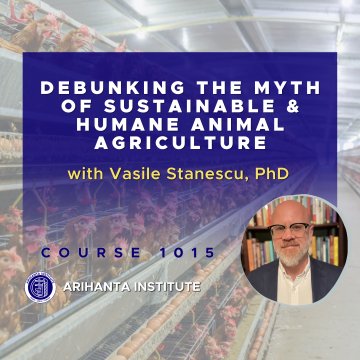
1015 | Debunking the Myth of Sustainable and Humane Animal Agriculture
In this course, we will focus on the “greenwashing” and “humanewashing” by animal agriculture. “Greenwashing” is based on the different ways that animal agriculture pretends it is sustainable when it is not; “humanewashing” refers to the different ways that animal agriculture pretends it treats animals well, when it does not. In reality, animal agriculture is one of the single largest drivers of climate change and one of the most cruel industries imaginable; however, much like the tobacco industry and the fossil fuel industries before it, animal agriculture has responded to this reality not by enacting any substantive changes, but by relying on “tricks” of communication, including public relations, media relations, marketing, and even attempts to influence scholarship on the topic to confuse the public and hide their destructive practices. In this course, we will debunk these rhetorical tricks and expose the reality of the harms animal agriculture is causing to both animals and our planet. This course should be of benefit to any activist, policy maker, or person concerned about climate change, environmental destruction, or animal suffering. Course Details6 hours of recorded video contentWeekly readings for self-studyAccess to class materials begins Monday, August 5, 20244 scheduled Live Q&A sessions with Professor Stanescu on August 9, 16, 23, and 30 from 9AM to 10AM Pacific + Bonus Session Sept. 6!
$25.00 USD
Instructor
Self-paced
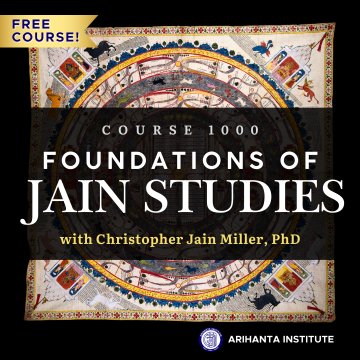
1000 | Foundations of Jain Studies
Added to cart
1000 | Foundations of Jain Studies
This course offers an introduction to Jain Studies. Begin with an exploration of key Jain teachings and practices, focusing on the principles of non-harming (ahiṃsā) and non-possession (aparigraha), both central to the tradition. Delve, then, into the Three Jewels of Jainism—right worldview, right knowledge, and right conduct—and examine how these principles shape the foundation of the Jain tradition. Next, investigate the profound connection between Jainism and animal advocacy, exploring the teachings of Mahavira on animals as well as contemporary Jain practices of animal care. Afterwards, explore the Jain perspective on the human body, including the importance of health, the role of karmas in shaping one’s embodiment, and the fine line between bodily renunciation and the need to have good health. Finally, observe how Jainism’s commitment to compassion and social justice is expressed through transformative social initiatives, focusing on the work of Acharya Chandanaji and the global reach of her charitable organization, Veerayatan. This is designed as a one-week course that will take approximately 3 hours to complete, and includes a series of 14 lectures with accompanying readings and a final quiz to guide you through essential foundations in Jain Studies. Learning Objectives:Understand the core principles of Jainism, including the practices of non-harming (ahiṃsā) and non-possession (aparigraha)Analyze the Three Jewels of Jainism (right worldview, right knowledge, and right conduct)Evaluate the relationship between Jainism and animal advocacyLearn the Jain perspective on the human body and its role in spiritual practiceAssess the role of compassion and social justice in Jainism




 Pratik Bhansali
Pratik Bhansali Vinita Dugad
Vinita Dugad Christopher Miller, PhD
Christopher Miller, PhD Cogen Bohanec, MA, PhD
Cogen Bohanec, MA, PhD Jan Dutkiewicz, PhD
Jan Dutkiewicz, PhD Jonathan Dickstein, PhD
Jonathan Dickstein, PhD Vasile Stanescu, PhD
Vasile Stanescu, PhD